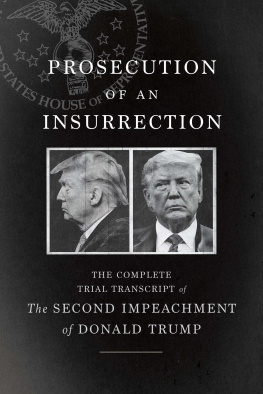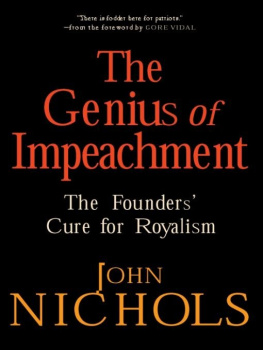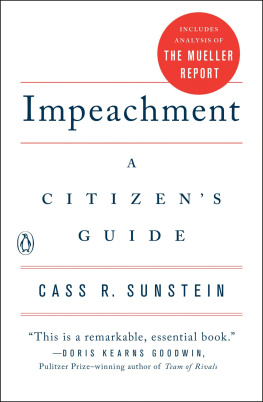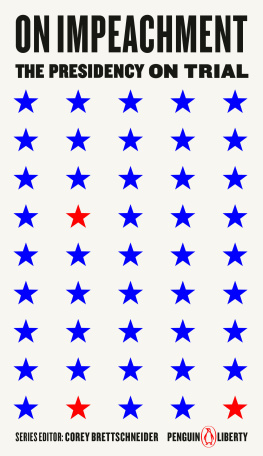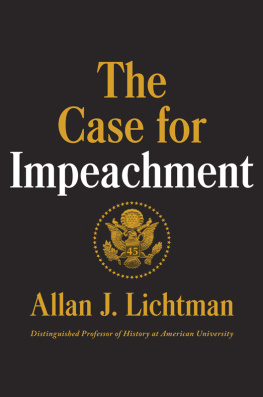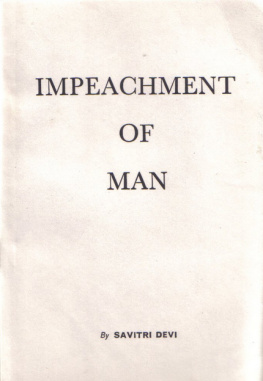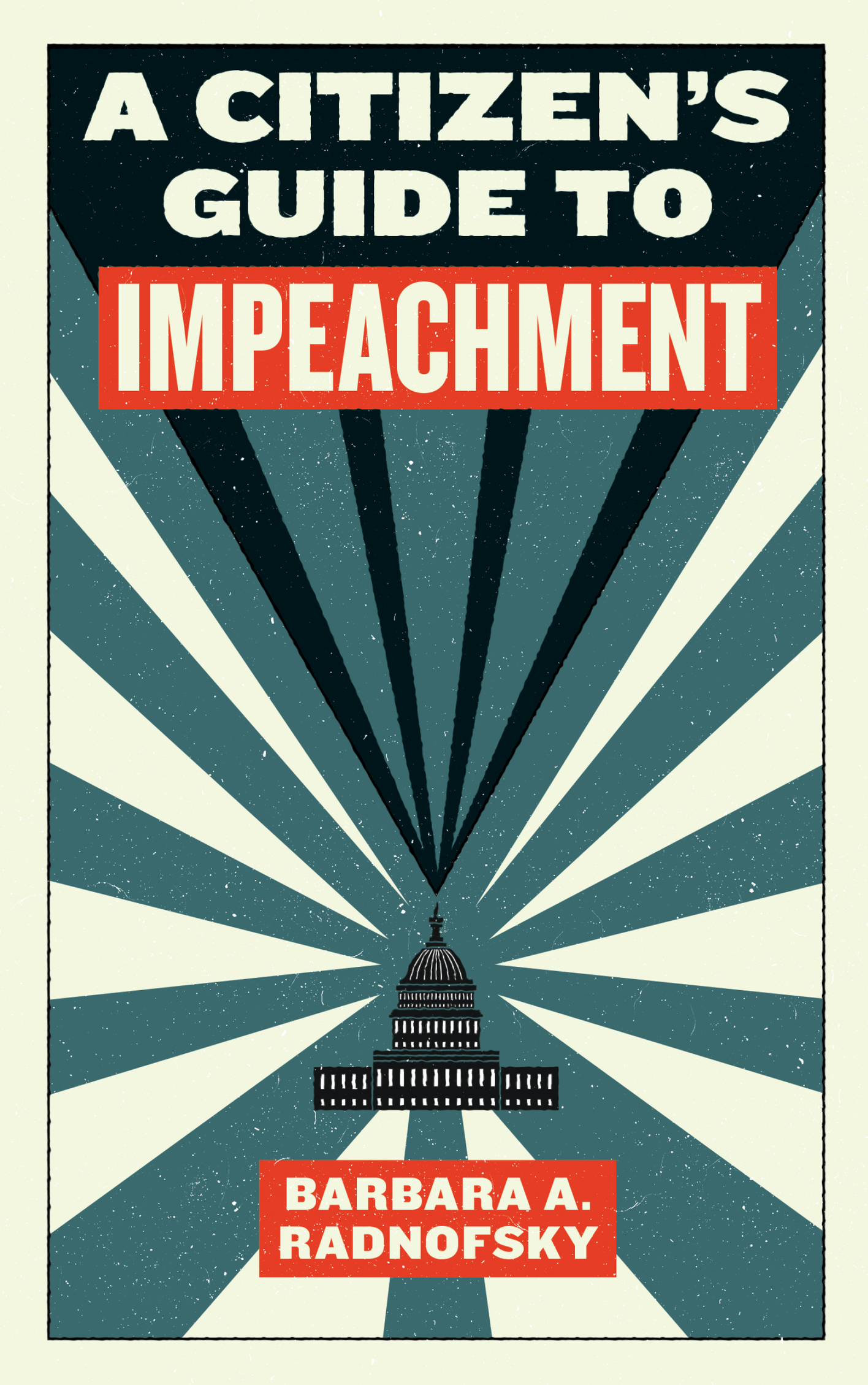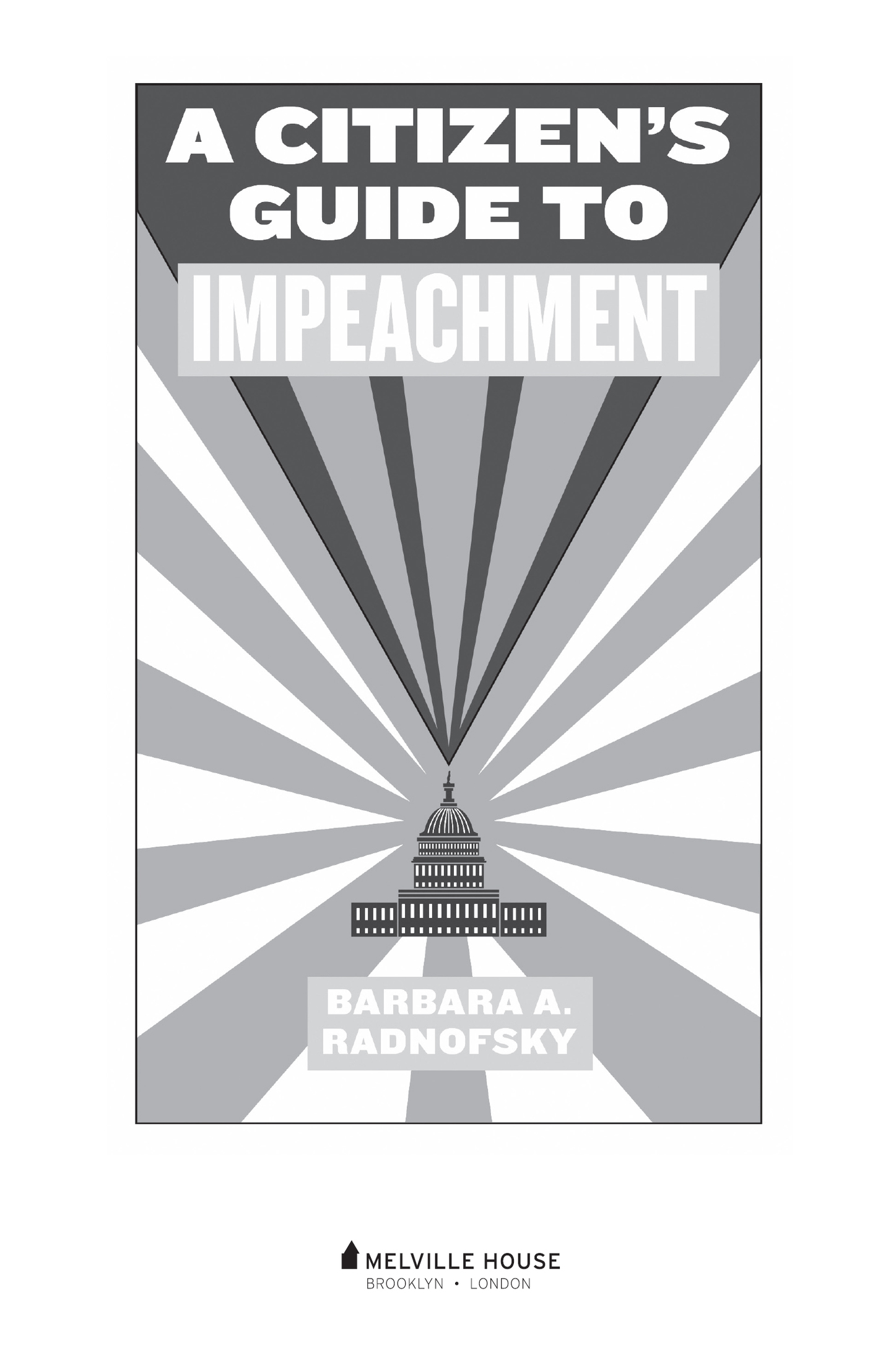Copyright 2017 by Barbara A. Radnofsky
Names: Radnofsky, Barbara Ann, 1956- author.
Title: A citizens guide to impeachment / Barbara A. Radnofsky.
Description: Brooklyn : Melville House, 2017. | Includes bibliographical references and index.
Identifiers: LCCN 2017035521 (print) | LCCN 2017036541 (ebook) | ISBN 9781612197067 (reflowable) | ISBN 9781612197050 (paperback)
Subjects: LCSH: ImpeachmentsUnited States. | BISAC: POLITICAL SCIENCE / Political Process / General. | LAW / Government / Federal. | POLITICAL SCIENCE / Constitutions.
INTRODUCTION
I n the United States, impeachment is a constitutional process by which Congress can remove high officials, including the president, the vice president, federal judges, and cabinet members, from office.
The Americans who fought in the Revolutionary War had a clear sense of the dangers ofand how to combata tyrannical, badly functioning, negligent, or incapacitated official in power. They foresaw U.S. civil officers as human beings prone to the same harmful tendencies and disabilities as the British king and his minions.
The remarkably well-educated American victors thoughtfully adapted British law Related constitutional clauses that describe the process give Congress (the legislative branch of government) sole power to impeach and remove a badly performing high official.
The U.S. impeachment process can result in the removalbut not the criminal punishmentof a U.S. public official who would cause substantial harm: Bribery, or other high Crimes and Misdemeanors. U.S. Const. Art. II, Sec. 4.
The special phrase high Crimes and Misdemeanors is lifted directly from ancient British impeachment law and forms the cornerstone of the U.S. impeachment process. It is a term (legally, a term of art) that bears no resemblance to what we know as crimes or misdemeanors today. It requires no charging of a crime, no intent to do a wrong, and no law-breaking. When presenting a case for impeachment, Congress may charge (and has charged) civil officers as acting with intent, treachery, criminal misconduct, and law-breaking, but the Constitution requires no proof of suchnonein order to impeach.
The United States Congress has impeached and convicted officials regardless of their mental stateeven a person conceded as insane, in the words of the nineteenth century, as well as persons capable under the law of forming intent. Congress has also impeached calculating, treasonous, corrupt, swindling, or profiteering officials who could substantially harm us.
While many of these stories involve crooks and swindlers who intentionally betrayed trust, sexually assaulted their employees, bribed, stole, sold out their country to enhance the value of their vast landholdings, violated Americas foreign policies, fomented war, covered up misdeeds, obstructed justice, committed perjury, and tampered with witnesses, the key factor in considering the impeachability of public officials for other high Crimes and Misdemeanors is the harm they can cause;
This book traces American impeachment history from the countrys founding to today, using the nineteen cases of U.S. impeachment of judges, a cabinet member, a senator, and presidents, plus other important examples of impeachment activity that did not reach the stage of formal House impeachment. But behind the history of the Impeachment Clause in the United States lie centuries of British law and legal practice related to impeachment, which greatly influenced the Founding Fathers thinking as they created our system of government laid out in the Constitution. Our foundational documents, including the Constitution and its phrase high Crimes and Misdemeanors, are interpreted by looking to the thinkingthat is, the intentof the Founding Fathers and framers of our countrys foundational documents.
So, while its important to understand that harm to society is the significant element emerging in the history of U.S. impeachment cases, its equally important to know what the Founding Fathers intentions were as they debated, crafted, and finalized the Constitutions impeachment clause. The Constitution was written and adopted at a national convention in Philadelphia in 1787 and then became effective in 1788 as a result of votes in state ratifying conventions. The Founding Fathers recorded for posterity their intent to adapt the British law of impeachment, as they displayedin articles, books, argument, and advocacy at Constitutional Convention debates and then on the floor of Congressa sophisticated understanding of British history, law, and terminology adapted for use in American impeachment proceedings.
ORIGINS OF IMPEACHMENT LAW
I n the twentieth century, scholars argued about whether they, or the public, needed any knowledge of British law in the context of impeachment. One school of thought has suggested that the writers of the Constitution, and the Constitution-ratifying convention delegates, lacked specialized knowledge of British law and, therefore, modern students of impeachment need no such knowledge either. These demonstrably incorrect assumptions, if believed, would rob us of understanding the intent and purpose of the Founding Fathers for use of the Impeachment Clause.
January 4, 2018, marks the 250th anniversary of the 1768 publication in the Boston Gazette of Josiah Quincy, Jr.s, article calling attention to English impeachments for high treason in subverting the fundamental laws and introducing arbitrary power. The article ended with a ringing call to follow these examples of impeachment actions.
Within two decades of the Boston Gazettes publication, the United States of America had declared independence, fought and won a war against England, tried to exist under a Confederation of States, and then adopted a federal system to replace the states confederation. The new Constitution, revised and polished in Philadelphia at the Constitutional Convention, emerged with our current Impeachment Clause.
In deciding on language and voting for the Impeachment Clause, the Founding Fathers relied on their experiences and expertise in English law and its application in America. Many Founding Fathers studied law in England as well as in the colonies; the colonials kept their libraries well stocked with books on British impeachment.



